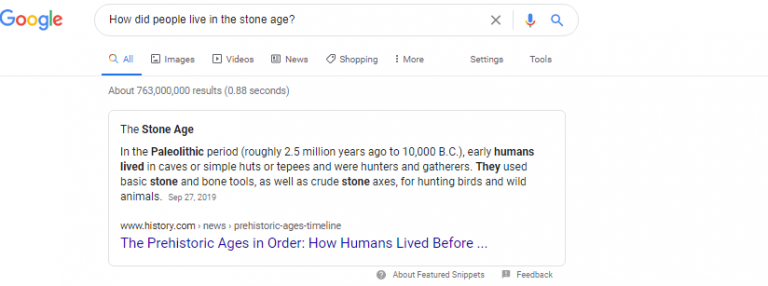Google: From A Search Engine To An Answer Engine?
-

Aaron Gray
- Blogs
-
 October 21 , 2020
October 21 , 2020 -
 3 min read
3 min read
The digital world is changing into an answer economy; users are expecting direct answers to complex questions and marketers need to understand this trend and prepare for it
What’s an answer engine?
Answer engines are essentially search engines specialized in answering user questions. Through highly sophisticated artificial intelligence (A.I.) and machine learning, they can create the link between user’s intent and web content.
As such, this allows them to answer any complex questions in the form of a featured snippet (that small summary box you see on top of the search page).
Here’s an example:
Go to Google and type in ‘How did people live in the stone age?’
The search engine will likely provide you with a highly precise snippet taken from history.com which thoroughly answers your question. You don’t even need to click the link and go to the trouble of reading the entire article to find your answer. Not only that, but if you ask Google Assistant, it will even read it out loud for you!

What kind of magic is this? How are they able to do it?
Simply put, the rise of voice search has transformed the way people use a platform like Google. Nowadays, users want immediate and concise answers to their questions as opposed to clicking on blue links and reading a 1000+ word article just to find their answer.
As stated earlier, it’s all about deciphering the relationship between user intent and content. As for Google, they use machine learning, complex A.I., and decades of data on our online behavior to reach this level of sophistication.
How does it affect my SEO and traffic? Should I invest time and energy into it?
Short answer: yes. SEO will always be relevant, no matter what happens. This is not about backlinks or authority sites…those are simply guidelines that Google recommends and they’re constantly changing. Remember back in 2009 when Web 2.O Link Building was the next big thing? Now it’s nothing, because user behavior changes and, in turn, the algorithm needs to adapt to accommodate those changes.
However, we highly recommend doing some Answer Engine Optimization (AEO) for your website. This will allow you to analyze your on-site content and even get some experience to take full advantage of this trend.
According to SEMRush, 41% of questions have featured snippets. This study was conducted a few years ago, so you can expect the number to be even bigger by now.
Next time you want your website to be featured on one of the rich snippets, try creating highly specific, concise content to answer questions in your niche. To help you understand what audiences are searching for, you can even use a service like Answerthepublic. They will give you actionable data and insights on which to base your AEO efforts.
Subscribe to Our Blog
Stay up to date with the latest marketing, sales, service tips and news.
Sign Up
"*" indicates required fields


